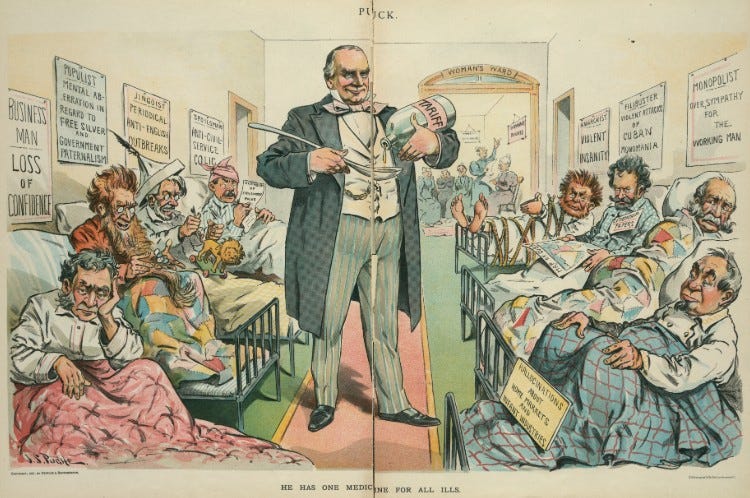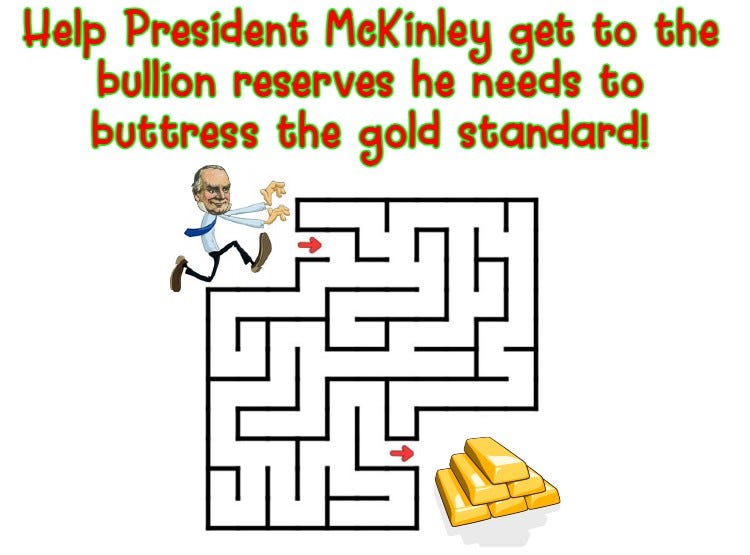Trump's William McKinley Fetish is a Real Curveball
Of all the things I didn't expect, this is one of the least expected

I’ve learned to expect the unexpected with Trump. Remember when he ruined Santa for a seven year-old? Remember when he called for The Purge? Remember when he created Space Force, and then forgot about it? Trump just does weird shit, and I’ve made it my policy to tune him out. So, in his second term, I won’t bat an eye when he serves pork chops to Netanyahu, or when he gets mad at Jupiter for having too many moons, or when he gives the Congressional Medal of Honor to the Little Caesar’s Pizza Guy.
But I confess: I did not see Trump’s hard-on for William McKinley coming. In his inauguration speech, Trump devoted a full paragraph to McKinley’s achievements — for comparison, Ukraine, TikTok, and health insurance all went unmentioned. Trump has served as McKinley’s hype man other times, like when he called McKinley “the most underrated president” and said “he made this country rich.” And, of course, Trump wants to call that mountain in Alaska Mount McKinley again, which is both culture war red meat and William McKinley fan service, i.e. Trump’s only apparent interests other than food.
Where did this come from? Trump is not a historical scholar: He seemed to think that Frederick Douglass is still alive [ed note: he is extremely not] and said that Andrew Jackson — who died in 1845 — was upset about the Civil War. My guess is that Trump saw something about William McKinley and ran with it — there have been times when one piece of information seemed to get in Trump’s brain and grow like an invasive species. So, maybe there was something on The History Channel about McKinley, or maybe there was a factoid on a Snapple cap, or something on the back of a Happy Meal — this type of thing:

Trump’s McKinley fandom clearly has a lot to do with tariffs — he’s called McKinley the “tariff king”. And Trump is right that McKinley is associated with tariffs: The Tariff Act of 1890 is named for him (he proposed it when he was in Congress), and he signed another major tariff bill as president in 1897. Trump is not wrong that McKinley was a Tariff Guy — Trump didn’t confuse tariffs with torts, or William McKinley with Spuds MacKenzie, and he didn’t go on some tangent like his Hannibal Lecter riff that just left everyone scratching their heads. And in fact, McKinley’s opponents called him “the Napoleon of tariffs”, which the same as calling him the “tariff king” except 230% more badass.
Unfortunately, just about everything else Trump believes about the situation is wrong. Trump thinks that tariffs made us rich, but that’s a simple “correlation doesn’t mean causation” error. The turn of the century was generally an era of high growth, but there was one huge recession in there, and tariffs of that time fluctuated. Plus, if you’re going on correlation alone, you could just as easily attribute turn-of-the-century growth to high levels of immigration. Professor Doug Irwin of Dartmouth — who is, as far as I can tell, the only scholar of this history — threw cold water on the “tariffs caused the Gilded Age” theory by saying (at 10:45 here): “What was the contribution of tariffs? You can cut it both ways — it seems to have been relatively small one way or the other.” So, take that, Trump — ya got Irwin’d!
Trump also thinks that tariffs generated a budget surplus that was squandered. Here’s his understanding of events, as told to Businessweek last year:
“William McKinley made this country rich. He was the most underrated president. And those that followed him took the money. Roosevelt took the money and built, you know, the whole thing with the parks and the dams. But McKinley made the money, and he was truly the tariff king.”
We’ll give Trump the benefit of the doubt and assume that he knows that Theodore Roosevelt — who succeeded McKinley — and Franklin Roosevelt — who built “the whole thing with the parks and the dams” — are two different people. It’s a big leap, though, to connect McKinley to FDR, because the years in between the two presidents saw the end of McKinley’s tariffs in 1909, the federal income tax in 1913, World War I, and the Great Depression. But even if we overlook those events — and please note that I just waved away the Great Depression and a fucking world war — Trump’s numbers are still nonsense. At the turn of the century, tariffs and excise taxes typically brought in about $500 million,1 or roughly $815 million in 1932 dollars. The federal budget in 1932 — the year before Roosevelt took office — was $3.6 billion. So, if McKinley-era tariffs had been pure revenue — that is, the government didn’t spend a single penny of what they took in — that revenue would still not have covered even one quarter of federal spending before the New Deal. So, Trump is trafficking in economic dumbassery worthy of the pages of Jacobin.
McKinley actually had a change of heart about tariffs while in office. Professor Irwin — whom I’m going to start calling the “tariff king king”, because he’s quoted in every fucking article I’ve read on this topic — observes that McKinley’s priorities seem to have changed once he was representing the whole country and not just Ohio. On September 5, 1901, McKinley gave an address in which he argued against trade protection, noting that “isolation is no longer possible or desirable” and calling it fanciful to think that “we can forever sell everything and buy little or nothing.” And I gave the exact date of that address because McKinley was shot by an assassin on September 6, 1901. Had he lived, he might have left a very different legacy for future generations to wildly misinterpret.
So, as usual: Trump doesn’t know what he’s talking about. I’ll at least give him points for originality — any Republican can tout Reagan or Lincoln in a self-serving way, but Trump has chosen an obscure, back-of-the-Hall-of-Presidents president to idolize. That’s punk rock — Trump is like a hipster arguing that Echo & the Bunnymen are the best band of all time. And I do find it funny that Trump somehow encountered something about McKinley — perhaps on the video screen on a gas station pump or in a Highlights magazine at the dentist’s office — and now he’s McKinley’s #1 fan. And it will remain funny until Trump’s misunderstanding of history sparks a recession.
GDP at the turn of the century was around $20 billion, and tariffs and excise taxes usually raised around 2.5% of GDP, so $20,000,000,000 x .025 = $500,000,000.







I’m now feeling deeply uncomfortable as a Democrat who feels very strongly that Echo & the Bunnymen was indeed the greatest band of all time. Goddammit Trump.
And here I’d gone all in on the betting site 19thCenturyPresidentFans[dot]com that Trump was going to be yanking it to Rutherford B. Hayes (“What a tremendous job he did, a Republican who ended Reconstruction. Just tremendous.”).